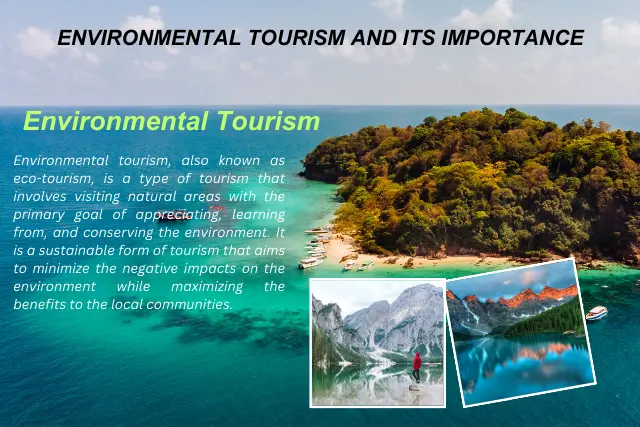
Environmental tourism and its Importance
Environmental tourism, also known as eco-tourism, is a sustainable form of tourism that involves visiting natural areas with the primary goal of appreciating, learning from, and conserving the environment. This form of tourism promotes responsible travel practices, supports conservation efforts, and provides economic benefits to local communities. In this article, we will explore the importance of environmental tourism, its positive impacts on the environment, local communities, and visitors, and how it can contribute to sustainable development, biodiversity conservation, cultural preservation, and improved environmental policies.
What is Environmental tourism?
Environmental tourism, also known as eco-tourism, is a type of tourism that involves visiting natural areas with the primary goal of appreciating, learning from, and conserving the environment. It is a sustainable form of tourism that aims to minimize the negative impacts on the environment while maximizing the benefits to the local communities.
Environmental tourism typically involves activities such as bird watching, hiking, camping, and wildlife observation in natural habitats such as forests, mountains, and marine environments. The focus is on immersing oneself in nature and learning about the local flora and fauna, geology, and cultural history of the area.
Why is environmental tourism important?
Environmental tourism promotes responsible and sustainable travel practices, supports conservation efforts, and provides economic benefits to local communities, making it an important form of tourism in today’s world.
It is important for many reasons, including conservation, economic benefits, cultural exchange, education, environmental awareness, climate change mitigation, and long-term sustainability.
Environmental tourism is important for several reasons.
- Conservation
- Sustainability
- Education
- Economic benefits
- Cultural Exchange
- Mitigation of climate change
- Long-term sustainability
Conservation
By promoting the conservation of natural areas and wildlife, environmental tourism helps to preserve the world’s biodiversity and protect fragile ecosystems. The revenue generated from tourism can also provide funding for conservation efforts and incentivize local communities to protect their natural resources.
Sustainability
Environmental tourism is a sustainable form of tourism that focuses on minimizing the negative impacts on the environment while maximizing the benefits to local communities. It promotes responsible travel practices that respect and protect the environment, and encourages sustainable development that benefits the local economy and environment.
Education
Environmental tourism provides opportunities for visitors to learn about the natural world, local cultures, and conservation efforts. It can also promote environmental awareness and inspire visitors to become more environmentally conscious in their daily lives.
Economic benefits
Environmental tourism can provide economic benefits to local communities, including job creation, increased revenue from tourism-related activities, and support for local businesses.
Cultural exchange
Environmental tourism also provides an opportunity for cultural exchange between visitors and local communities. Visitors can learn about the culture and traditions of the local people, while locals can learn from visitors about their culture and way of life.
Mitigation of climate change
Environmental tourism can help mitigate climate change by promoting the use of renewable energy, reducing carbon emissions, and supporting conservation efforts that protect forests and other natural carbon sinks.
Long-term sustainability
Environmental tourism promotes sustainable practices that can ensure the long-term viability of natural resources and support local communities. By investing in sustainable tourism, we can create a future where people and the environment can thrive together.
Positive impact on environmental tourism
Environmental tourism promotes responsible and sustainable travel practices, supports conservation efforts, and provides economic benefits to local communities, making it an important form of tourism in today’s world.
Environmental tourism can have a wide range of positive impacts on the environment, local communities, and visitors. These impacts can contribute to sustainable development, biodiversity conservation, cultural preservation, and improved environmental policies.
There are several positive impacts that environmental tourism can have on the environment, some of which are.
- Conservation of natural resources
- Sustainable development
- Education and awareness
- Cultural preservation
- Economic benefits for local communities
- Biodiversity conservation
- Improved environmental policies
- Reduced carbon footprint
- Health and wellbeing
Conservation of natural resources
Environmental tourism can encourage the conservation of natural resources by creating economic incentives for the preservation of ecosystems and wildlife. This can include the protection of forests, wetlands, coral reefs, and other natural habitats that provide vital ecosystem services.
Sustainable development
Environmental tourism can contribute to sustainable development by promoting economic growth in a way that balances social, economic, and environmental considerations. This can include the creation of jobs in ecotourism and related industries, as well as the development of infrastructure that supports sustainable tourism.
Education and awareness
Environmental tourism can help to raise awareness of environmental issues and educate visitors about the importance of conservation and sustainability. This can lead to greater public support for environmental protection and conservation efforts.
Cultural preservation
Environmental tourism can help to preserve cultural heritage and promote cultural exchange. This can include the preservation of traditional practices and knowledge, as well as the promotion of cultural tourism that highlights local traditions and customs.
Economic benefits for local communities
Environmental tourism can provide economic benefits for local communities by creating jobs and generating revenue for local businesses. This can help to reduce poverty and improve the standard of living for local residents.
Biodiversity conservation
Environmental tourism can help to protect and conserve biodiversity by supporting conservation efforts and raising awareness about the importance of biodiversity. This can include the protection of endangered species and their habitats.
Improved environmental policies
Environmental tourism can help to improve environmental policies by raising public awareness about environmental issues and putting pressure on governments and policymakers to take action.
Reduced carbon footprint
Environmental tourism can help to reduce the carbon footprint of travel by promoting sustainable practices such as eco-friendly accommodations, renewable energy, and responsible tourism practices.
Health and well-being
Environmental tourism can have positive impacts on the health and well-being of visitors by providing opportunities for outdoor recreation, physical activity, and relaxation in natural settings.
Conclusion
Environmental tourism is an important and sustainable form of tourism that promotes responsible travel practices, supports conservation efforts, and provides economic benefits to local communities. It can have positive impacts on the environment, local communities, and visitors, contributing to sustainable development, biodiversity conservation, cultural preservation, and improved environmental policies. By choosing to participate in environmental tourism, travelers can not only enjoy the beauty of nature but also help to protect it for future generations.
You may like:




